Studies have shown that persons with disabilities (PWDs) are two to four times more vulnerable than the general population during an event of a disaster. Including the needs and perspectives of PWDs and other vulnerable groups in disaster management processes and humanitarian response can reduce their vulnerability to further harm.
On 16-18 December 2021, Super Typhoon Rai (local name Odette) made landfall several times in the Philippines, affecting 11.9 million children, women, and men and damaging 2.1 million homes, leaving many completely destroyed. Ten months since, many individuals have yet to recover.
Through the partnership of the Australian Government’s Department of Foreign Affairs and Trade (DFAT) and Community and Family Services International (CFSI), at least 2,200 households were, as of writing, provided with immediate humanitarian assistance in the CARAGA Region and the province of Southern Leyte, particularly in two cities and 18 municipalities adversely affected by Super Typhoon Rai. Each household provided with assistance has a member of at least one PWD and/or elderly – some with chronic illnesses.
In Surigao del Norte, including the island of Siargao, CFSI distributed shelter assistance materials such as plastic sheets (tarpaulins) and cash assistance, which enabled families to buy shelter tools or life-saving goods to address immediate needs.
Each beneficiary has a story of strength and survival.
Turning Short-Term Support into Long-Term, Sustainable Progress
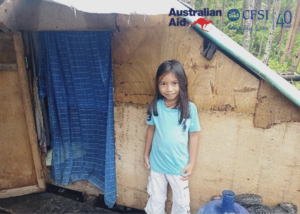
Quenna, a 7 year old girl with polio, standing in front of her temporary home in May 2022
Quenna is seven-years old and suffers from poliomyelitis or polio. Due to her condition, she was unable to walk until she reached the age of five. During those years, her parents did not have a choice but to keep her inside their home – a small nipa hut near the shoreline. When super typhoon Rai hit the Philippines, it also took Quenna and her family’s home, leaving them devastated and in urgent need of life-saving support.
Responding to little Quenna and her family’s urgent needs, CFSI gave them shelter and cash assistance. The tarpaulin was used as temporary shelter before they could repair their home, while the cash was used to buy milk for Quenna and her three other siblings, as well as some construction materials and carpentry services.
When we first met Quenna, she was in second grade and hoped to overcome her condition, finish her studies, and help her parents in the future. Months later, when we checked back in with Quenna and her family, we found that she’s continued her studies with her two sisters. While she continues to have difficulty walking due to her polio, she is able to do so independently. She has progressed to the third grade and is ecstatic about the return of face-to-face classes.
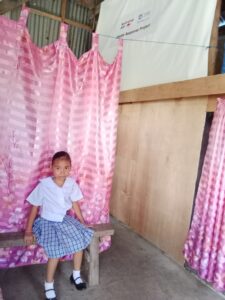
Quenna at home, preparing for school
We’re confident that Quenna will one day achieve great things, especially her dream to become a teacher – she was so excited to go to school that she reminded us that it was almost time for her to leave.
Her family also expressed their gratitude for the continued support from CFSI, possible with support from the Australian Government. Through continued interventions of CFSI, her family was able to take part in the Cash for Work initiative, which in turn helped them buy school supplies for their children. Her father, a fisherman, is now also back to working his normal fishing days and is proudly able to put food on the table.
Against a backdrop of disaster where resources are limited, CFSI continued the work on the ground to ensure that uprooted communities needing urgent assistance are provided with the support that they need, and that the most vulnerable persons are put at the forefront of aid. For Quenna’s family, the cash and shelter assistance, paired with the continued support through the Cash for Work project, one of CFSI’s complementary initiative, has proven to be instrumental. It helped ensure that Quenna and her siblings continue their education and supported their parents to provide for them and gain independence. Despite the continued challenges brought about by the devastation of Typhoon Odette, Quenna’s family is thriving, and well on their way to rebuilding their lives.
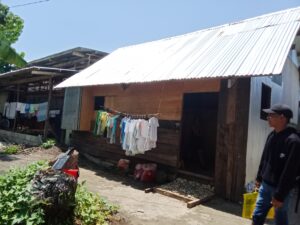
Quenna and her family’s new home
CFSI Staff Going the Extra Mile
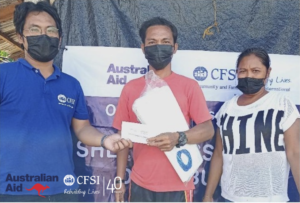
Rolex emotionally receives cash assistance and a tarpaulin for shelter support.
Rolex Diaz, 43, suffered from a stroke, and while still able to walk, he does so with difficulty. On the day of aid distributions, Rolex was told that he was not included in the list of beneficiaries. According to his wife, Rolex was not in the local government’s registry of persons with disabilities because he was not officially recognized as a PWD since his condition was caused by an illness.
Part of CFSI’s work during emergencies such as this include ensuring that as many people as possible are being reached – this includes ensuring that there is no duplication in aid provision. Appropriately, after learning about his case, a CFSI community staff member noticed that an individual from the official list of beneficiaries had already received assistance, meaning that there was a slot available for another beneficiary.
CFSI staff immediately looked for Rolex to deliver the assistance that he had been expecting that day. Rolex, relieved, became emotional and could not believe that CFSI went back for him.
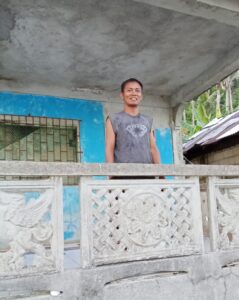
Rolex, happy and healthy back home.
Months later, Rolex told CFSI that he has recovered from the trauma caused by Typhoon Odette as well as his stroke. His wife was able to go back to work in the Siargao’s tourism industry, and while his doctor advised him to not return to fishing for his own safety, he continues to be healthy and happy, and now stays at home to care for his wife and five children. “I am so thankful that God sent you as instruments to help us, especially because I can’t work anymore because of my situation.”
Rolex shared that the assistance they received saved them from hunger. Using the cash assistance, they were able to buy rice and milk for the family and medicine for himself. The tarpaulin served as temporary roofing for their home after their roof was blown away during the typhoon. Now, they are planning to reuse the tarpaulin as a roof for their small boat, to protect his children from the sun and rain when they go to school in the neighboring island.
Supporting Independence and Giving Purpose
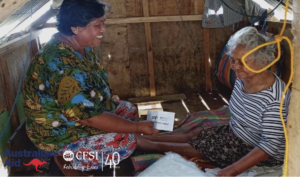
Nanay Restituta’s daughter hands her cash and shelter assistance from CFSI.
Restituta Espino is an 88-year-old senior citizen who lives in a small nipa hut. Nanay (Mother) Restituta, due to her age, is now bedridden. CFSI met her daughter, who received shelter and cash support for her mother.
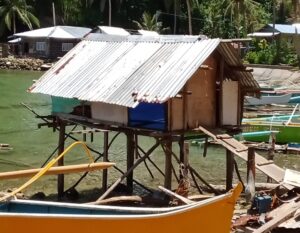
Nanay Restituta’s home
Nanay Restituta was so happy and could not stop smiling when she heard the news. When asked to be photographed by CFSI, nanay Restituta eagerly said, “Wait, I need to fix my hair first. Find me a comb!” – a happy response that reflects gratitude for a simple yet memorable service.
At present, Nanay Resituta continues to live in the same house, and has expressed that while her family helps provide for her basic needs, she refuses to live with them as she does not want to become a “burden” due to her old age and inability to walk.
The tarpaulin she received served as a temporary wall to keep sunlight and other elements out of her home. CFSI continues to support nanay Restituta through referrals and participation in other early recovery initiatives, which she said made her feel important and gave her purpose. Tearing up, she said, “I want to thank you because I was able to buy more milk and medicine for myself.”
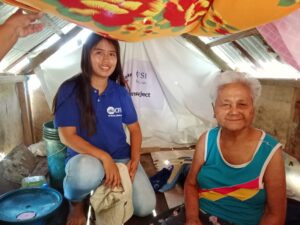
Nanay Restituta with CFSI Staff
Quenna, Rolex, and Nanay Restituta are only three out of thousands of individuals in the regions affected by super typhoon Rai/Odette who require exceptional care, especially in the face of disaster. Without someone looking out for them to ensure that they get the vital, often lifesaving support they need, they may fall through the cracks, forgotten and left behind. This is why it is integral to ensure that the needs and voices of persons with disabilities and elderly persons are accounted for in disaster management – from prevention, to response, and to rebuilding their lives.
CFSI’s Odette Response Project (ORP), under which Quenna, Rolex, and Nanay Restituta are beneficiaries, was possible with the strong support of the Australian Government. Together, CFSI and DFAT are committed to ensuring that no one is left behind, especially the vulnerable and disadvantaged, including persons with disabilities and the elderly population. Through the ORP, CFSI is able to support local efforts to save lives, protect the most vulnerable from more harm, and address the urgent humanitarian needs of over 23,000 most vulnerable individuals in some of the most affected cities and municipalities in the CARAGA Region and the province of Southern Leyte.
The ORP is just one of the humanitarian initiatives brought by the enduring friendship between the Philippines and Australia. Over the last 75 years, this partnership has promoted inclusion, restored hope, and rebuilt countless lives in the communities that it has served. #
–
Story revised in October 2022 to reflect updates

